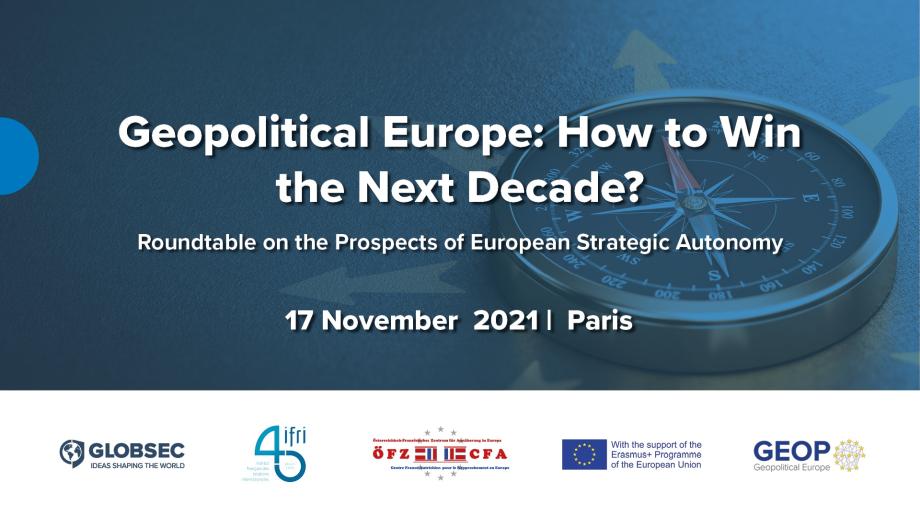17.11.2021 - Geopolitical Europe: How to Win the Next Decade? Roundtable on the Prospects of European Strategic Autonomy

Wednesday, 17 November
Paris
Given the profound changes in the geopolitical landscape and the fragmentation of the multilateral order, the European Union is forced to pursue a more independent and assertive international role, while strengthening relations with strategic partners.
The concept of European strategic autonomy has reared its head among European policymakers. It is representing the bloc´s push to increase its independence, self-reliance, and resilience in a wide range of fields – such as defence, trade, industrial policy, digital policy, economic and monetary policy, and health policy. A new more strategically autonomous EU that would be guided by principled pragmatism should prefer to achieve its goals in cooperation with partners but also should not be incapacitated by its critical dependencies.
While some EU leaders see it as a political imperative, others look at it with more skepticism. For example, the recent GLOBSEC and the Atlantic Council research shows that Central and Eastern Europe (CEE) is taking a cautious approach towards defining the degree of strategic autonomy. While CEE will not resist strategic autonomy at all costs, it is generally agreed in the region that decoupling should be measured and above all eschew isolationism. Strategic autonomy, moreover, should not become synonymous with applying double standards within the common market, nor should it be used as a tool to justify protectionism. In short, European strategic autonomy is not an impossible lift, but before things get off the ground, some fundamental questions need to be answered.
With the upcoming French Presidency of the Council, during which the Strategic Compass will be presented there is an opportune moment for a new era of European strategic culture and decision-making to begin.
In this 2-session roundtable we will strive to gain some insight into such questions:
- In what issue areas it is desirable and where not to be strategically autonomous?
- What resources will Europe need to commit?
- What is the position of different member states on European strategic autonomy?
- How should the EU work more strategically with third countries?
- How to handle the increased assertiveness of China and Russia’s challenges?
This event is a part of GLOBSEC project GEOPE - “Geopolitical Europe: are the EU member-states ready for it?” and it is supported by Jean Monnet Activities of the EU Programme Erasmus+.
Preliminary Programme
Welcome Remarks
- Dominique DAVID, Advisor to the Executive Chairman, French Institute for International Relations (IFRI) and Chair, Austro-French Centre for Rapprochement in Europe (ÖFZ/CFA)
- Jakub WISNIEWSKI, Special Adviser to the President, GLOBSEC
Keynote intervention
- Tomas KOZAK, Director General, Ministry of Foreign and European affairs (TBC)
--
“Towards a European Strategic Autonomy: Strengthening Capacities Where It Matters”
Kick-off speakers:
- Claude-France ARNOULD, Special Advisor to the President, French Institute for International Relations (IFRI)
- Danielle PIATKIEWICZ, Research Fellow, EUROPEUM
- Edouard SIMON, Research Director, French Institute for
- International and Strategic Affairs (IRIS)
- Marcin ZABOROWSKI, Policy Director, GLOBSEC
Led by:
- Alena KUDZKO, VP and Director of Policy Institute, GLOBSEC
--
“EU’s Approach towards Strategic Partners: Improving, Securing, Redefining”
Kick-off speakers:
- Elena POPTODOROVA, Vice President, The Atlantic Club
- Elin SCHIFFER, Project Manager, Atlantic Council
- Roland FREUDENSTEIN, VP and Head, GLOBSEC Brussels
- Velina TCHAKAROVA, Director, Austrian Institute for European and Security Policy (AIES)
Led by:
- Georgina WRIGHT, Senior Fellow and Director, Institut Montaigne